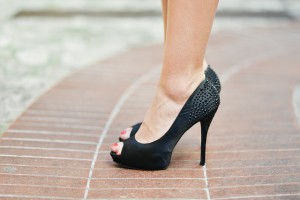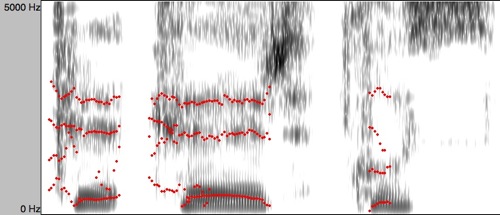Le FOOT vowel
 I was teaching phonetics to M.A. Linguistics students at University College London when something interesting happened.
I was teaching phonetics to M.A. Linguistics students at University College London when something interesting happened.
I pointed out the close similarity of the English FOOT vowel to “French schwa”, the vowel of le, de, je, ne, que, ce, me, etc. (“French schwa” is more rounded and higher than the mid central [ə] of English; the most accurate IPA symbol for it is [ɵ].)
Immediately there was a protest from one of my students, who happened to be French. She said that I couldn’t be right; if I were, “then [bʊk] would be pronounced [bɵk]!” At which point the other students burst into laughter. For the first time, she’d pronounced book the way they did.
Of course there’s a simple explanation for why she’d been using a different vowel from the native speakers around her. Instead of talking like them, she’d been talking like a dictionary. So instead of using the vowel of French le, [ɵ], she’d been using the vowel of German kaputt, [ʊ], which is what dictionaries recommend.
This, by the way, took place twelve years ago; those M.A. students are all now thirtysomethings or older, and their FOOT vowel is even more established as standard BrE. Here, courtesy of Google Translate, are French que, English could, and German Kuss. The first two have the same auditory vowel quality and the same formants (shown by red dots); while the German vowel quality and formants are very different indeed:

I see two problems in the established phonetic descriptions of the FOOT vowel. One is the conservatism of the widely used [ʊ] symbol: it encourages learners, who tend to be young, to sound very old-fashioned. (Though of course the German kaputt vowel is the right one if you want a North of England accent, or an Australian accent.)
Secondly, when the actual current pronunciation is described, it’s done in an uninsightful, unhelpful and/or vague manner. The contemporary FOOT vowel is described as [ʊ̟], or as exhibiting “FOOT fronting”, or “ʊ” is depicted as having moved in the vowel space. I think of this as “diacriticism”, by analogy with sexism, ageism, etc.: the preferred system is permitted a description with basic phonetic symbols, while other systems are described in terms of deviations and qualifications. In this case, of course, the preferred system is traditional RP – despite the fact that [ʊ], along with other RP vowels, is now very much on the… back FOOT.
Phonetic description should indicate when speech sounds are different, and when they’re essentially the same. I think phoneticians, who are trained to perceive fine differences, may sometimes be less interested in noting similarities. But such similarities are theoretically interesting and practically useful, for teaching. “French schwa” makes a rather handy cross-linguistic reference point for the English FOOT vowel.


“One is the conservatism of the widely used [ʊ] symbol: it encourages learners, who tend to be young, to sound very old-fashioned.”
In principle, yes, but wouldn’t a young, rosy complexion make up for this?
With regard to “I think of this as “diacriticism”, by analogy with sexism, ageism, etc.: the preferred system is permitted a description with basic phonetic symbols, while other systems are described in terms of deviations and qualifications”. On the contrary, your apparent eagerness to have us all change the symbol for the ‘foot’ vowel to an anyway typographicaliy undesirable ‘ɵ’ I’m inclined to put down to “IPA purism”. The most sensible policy in the world of pronunciation dictionaries and other items of the EFL industry (which has done its share to keep you and me from starving) is to chop and changed as little as possible so sticking with dear old ‘ʊ’ as a symbol makes good pragmatic sense.
Thanks, Jack, for stating the position of nostalgic conservatism so succinctly!
A number of readers do seem to think my main intention is to make phoneticians change their writing systems. But the main reason I do this blog is to present audio facts and to suggest interpretations of their patterns.
If the EFL industry is not going to take IPA seriously, what do you think about the idea that it could use non-IPA respelling systems instead?
Thanks for your great works Geoff. It is because of you that I really kind of understood why Daniel Radcliffe and Jackie Leonard (BBC) sounded so different than what I had learned from Daniel Jones and the Oxford dictionary and was able to fine-tune my pronunciation (being a Bangladeshi) so much that an Englishman who called me the other day wondered how could I sound so British without never being there in person!
Congratulations – and thanks for the kind words!
Or of course if you want to sound American outside the domains of short-vowel shifting (the Northern Cities, the Inland South, and parts of California), then the kaputt vowel is very much your friend. I just sampled my 7-year-old grandson’s NYC foot, and it is indeed [fʊt], identical with the most conservative RP.
What would be the contemporary American realization of the FOOT and GOOSE vowels? I certainly don’t hear American FOOT as /ʊ/ but it’s still a bit different from the British one to my ears. Perhaps /ʊ̈/? And /ʊ̝w/ for GOOSE?
Like GOOSE and GOAT, this one also seems to undergo backing (or rather, preserve its conservative realisation, [ʊ]) before coda /l/, as in full, bull, wolf etc. It sounds like “p[ɵ]sh and p[ʊ]ll” to my ears.
I agree, Egg. There’s a chapter ‘GOAT, GOOSE and FOOT Backing’ in my book English After RP.
Just like GOAT and GOOSE, this one seems to undergo backing (or rather, preserve its more conservative realisation, [ʊ]) before syllable coda /l/, as in full, bull, wolf etc. It always sounds like “p[ɵ]sh and p[ʊ]ll” to my ears.
I (a speaker of SSBE) have a FOOT-shwa merger and I expect it is becoming quite common among SSBE speakers.
Although I don’t see it documented anywhere – much like a lot of the things you write on your blog, which is why thought you might be interested.
They are both [ɵ̜], a kind of less rounded but still semi-rounded French shwa.
I am an isolated Northern Californian and I say unrounded just-above-mid [ɘ̞] for both FOOT and COMMA
So you don’t have a FOOT-commA contrast? Is your STRUT distinct from your FOOT-commA?
Yes it is. It’s lower and backer, around /\_+.
the /ue/ in que used to be a schwa but this is not the case for more than half of a century. And it most definitely does not sound as /ʊ/. It is more like the German /ö/. Some French teachers ephasise that there are a strong ue (similar to the German ö) and a more lax one. But this is a digression.
Keep me updated
Interesting article, I have been always wondering why foot is almost pronounced as furt (r is not pronounced) by British. Now I have the answer!!!